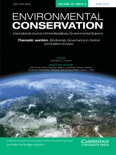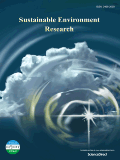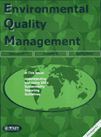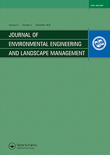
Euro-Mediterranean Journal for Environmental Integration
Scope & Guideline
Pioneering Interdisciplinary Research for a Greener Tomorrow
Introduction
Aims and Scopes
- Sustainable Resource Management:
Research addressing the sustainable use and management of natural resources, including water, soil, and biodiversity, with a focus on practices that mitigate environmental degradation. - Climate Change Adaptation and Mitigation:
Studies that explore the impacts of climate change in the Mediterranean region and propose adaptive strategies and mitigation measures to enhance resilience and sustainability. - Pollution Assessment and Remediation:
Investigations into environmental pollution, including the identification of pollutants, assessment of their impacts, and development of remediation technologies for contaminated sites. - Biodiversity Conservation:
Research dedicated to the conservation of biodiversity in Mediterranean ecosystems, emphasizing the role of native species, habitat restoration, and the impacts of human activities. - Innovative Environmental Technologies:
Development and application of innovative technologies and methodologies for environmental monitoring, waste management, and the enhancement of ecosystem services. - Socio-Economic Dimensions of Environmental Issues:
Exploration of the socio-economic factors influencing environmental policies and practices, emphasizing community engagement and stakeholder participation.
Trending and Emerging
- Circular Economy Practices:
An increasing number of papers focus on circular economy concepts, emphasizing waste reduction, resource recovery, and sustainable consumption patterns in various sectors. - Climate Resilience Strategies:
Emerging themes around strategies for enhancing climate resilience in urban and rural settings highlight the importance of adaptive practices in agriculture, infrastructure, and community planning. - Integrated Water Resource Management:
Research focusing on integrated approaches to water management is on the rise, reflecting the growing recognition of water scarcity and the need for sustainable practices in arid and semi-arid regions. - Eco-Innovation and Green Technologies:
There is a notable trend towards the development and application of green technologies and eco-innovation, particularly in waste management, energy efficiency, and pollution control. - Impacts of Urbanization on Ecosystems:
Increasing attention is being paid to the impacts of urbanization on natural ecosystems, including studies on urban heat islands, biodiversity loss, and sustainable urban planning.
Declining or Waning
- Traditional Agricultural Practices:
Research related to conventional agricultural practices is becoming less prominent as the focus shifts towards sustainable and innovative agricultural solutions in response to climate change. - Fossil Fuel Dependency:
Studies centered on fossil fuel extraction and utilization are declining, as the journal increasingly emphasizes renewable energy technologies and sustainable practices. - Single-Species Conservation Efforts:
There is a waning interest in research solely focused on single-species conservation, as holistic approaches addressing ecosystem health and interspecies relationships gain more traction.
Similar Journals

ENVIRONMENTAL CONSERVATION
Exploring Critical Issues in Conservation and PolicyENVIRONMENTAL CONSERVATION, published by Cambridge University Press, is a premier academic journal dedicated to advancing the field of environmental science and conservation. Since its inception in 1974, this journal has established a robust reputation, currently holding prestigious rankings in various categories including Q1 in Nature and Landscape Conservation and Q1 in Water Science and Technology, alongside notable Q2 rankings across several related fields. With its broad scope, ENVIRONMENTAL CONSERVATION covers critical topics in health, toxicology, pollution control, and environmental policy, making it an essential resource for researchers, professionals, and students aiming to address the pressing challenges of environmental sustainability. Despite not being an open-access journal, its impactful content, demonstrated by its significant positions in Scopus rankings, enhances scholarly discourse and informs policy worldwide. As we approach its 50th anniversary, this journal remains pivotal in fostering innovative research and promoting best practices in environmental stewardship.

Frontiers in Environmental Science
Pioneering interdisciplinary studies in environmental science.Frontiers in Environmental Science, published by FRONTIERS MEDIA SA, stands as a pivotal platform in the sphere of environmental research, showcasing innovative findings and interdisciplinary studies that address pressing environmental challenges. With an impressive open access policy since its inception in 2013, it enhances accessibility and promotes knowledge dissemination among researchers, practitioners, and students worldwide. The journal, recognized for its contributions with a Q2 ranking in the Environmental Science category and an engaging position within the 65th percentile on Scopus, provides a comprehensive archive of research that is both timely and relevant. Covering diverse topics from climate change to sustainable resource management, it inspires critical dialogue and fosters collaborative efforts to shape a more sustainable future. Based in Lausanne, Switzerland, this journal invites contributions that advance the field and fulfill its objective of bridging science with practical applications, making it an essential resource for anyone committed to the environmental sciences.

ENVIRONMENTAL ENGINEERING SCIENCE
Leading the charge in pollution control and waste management.ENVIRONMENTAL ENGINEERING SCIENCE is a leading journal published by MARY ANN LIEBERT, INC that provides a platform for pioneering research in the fields of environmental chemistry, pollution control, and waste management. With an ISSN of 1092-8758 and an E-ISSN of 1557-9018, this peer-reviewed journal aims to disseminate high-quality scientific studies that address critical environmental challenges. As evidenced by its 2023 category quartile rankings, it holds a notable position at Q3 in Environmental Chemistry and Pollution and Q2 in Waste Management and Disposal, highlighting its relevance and impact in these domains. Spanning over two decades from 1997 to 2024, the journal is dedicated to fostering innovations and promoting rigorous scholarship that can contribute significantly to sustainable environmental practices globally. Authors and researchers are encouraged to engage with this essential resource, which offers Open Access options to enhance the visibility and reach of their work. For those interested in advancing their understanding and practice within the environmental sciences, ENVIRONMENTAL ENGINEERING SCIENCE is an indispensable journal to consider.

Sustainable Environment Research
Elevating research to combat global environmental challenges.Sustainable Environment Research, an esteemed journal published by BMC, serves as a pivotal platform for disseminating innovative research in the fields of Environmental Engineering, Pollution, and Renewable Energy. Established in 2016 as an Open Access journal, it facilitates the widespread sharing of knowledge and advancements across the globe, reflecting its commitment to enhancing environmental sustainability. With an impressive Q1 ranking in multiple categories, including Water Science and Technology and Pollution, the journal is recognized for its significant impact, currently holding a rank of 31st in Environmental Science - Water Science and Technology. The journal actively invites researchers, professionals, and students to contribute to crucial discussions around sustainable practices and technologies, thus addressing worldwide environmental challenges. Based in Taiwan but accessible internationally, Sustainable Environment Research provides a valuable resource for those dedicated to advancing the science of sustainability.

ENVIRONMENTAL QUALITY MANAGEMENT
Transforming Environmental Science into Actionable PolicyENVIRONMENTAL QUALITY MANAGEMENT is a respected journal published by WILEY, focusing on interdisciplinary studies that merge environmental science with public health, management, policy, and law. Since its inception in 1991, this journal has provided a platform for researchers and practitioners to share innovative insights and advancements in understanding environmental quality and its impacts on human health and the ecosystem. With an ISSN of 1088-1913 and an E-ISSN of 1520-6483, it holds a significant position in the academic community, evidenced by its presence in the Q3 quartile across several categories, including Management, Monitoring, Policy and Law, as well as Pollution and Waste Management. Although it is not an open-access journal, it continues to be a vital resource for those in the environmental sector, offering robust evaluations and discussions that advance knowledge and foster improved practices. With Scopus rankings demonstrating its relevance among other titles in the field, ENVIRONMENTAL QUALITY MANAGEMENT plays a crucial role in shaping discourse and informing policy in an increasingly vital area of study.

Frontiers of Environmental Science & Engineering
Exploring the nexus of science and engineering for a greener planet.Frontiers of Environmental Science & Engineering is a premier journal published by HIGHER EDUCATION PRESS that stands at the forefront of interdisciplinary research in environmental science and engineering. Established in 2013 and converging its scope through 2024, this journal has swiftly ascended to a notable Q1 category in the Environmental Science (Miscellaneous) segment, highlighting its remarkable impact and relevance. With a Scopus ranking of 27 out of 233 in its field, placing it within the top 88th percentile, it serves as a crucial platform for disseminating cutting-edge research, innovative methodologies, and pressing environmental concerns. Researchers, professionals, and students alike will find valuable insights and opportunities for collaboration within its pages. While the journal operates under a subscription model, its commitment to advancing the field makes it an essential resource for those dedicated to addressing the world's environmental challenges, fostering sustainable practices, and pioneering engineering solutions.

ENVIRONMENTAL MANAGEMENT
Championing impactful research in ecology and pollution.ENVIRONMENTAL MANAGEMENT, published by Springer, stands at the forefront of advancing sustainability and ecological stewardship in the fields of Ecology, Global and Planetary Change, and Pollution. With an impressive tracking history from 1977 to 2024 and prestigious quartile rankings reflecting its significant impact (Q1 in Ecology and Q2 in both Global and Planetary Change and Pollution), this journal engages a wide range of stakeholders, including researchers, policymakers, and environmental professionals. The journal is a vital resource for those dedicated to addressing pressing global environmental challenges, publishing rigorous interdisciplinary research that informs policy and practice. While it does not offer open access, its content remains accessible through institutional subscriptions. Located in the heart of New York, ENVIRONMENTAL MANAGEMENT is dedicated to fostering a substantive dialogue on innovative approaches to environmental preservation and management.

One Earth
Advancing the frontiers of Earth and Environmental Science.One Earth is a premier academic journal published by Cell Press, dedicated to advancing research in the fields of Earth and Planetary Sciences as well as Environmental Science. With an impactful presence in the academic community and an impressive ranking, One Earth has achieved Q1 status in both Earth and Planetary Sciences and Environmental Science, showing its commitment to the highest standards of scholarly excellence. Founded in 2019, this journal has quickly established itself as a leading platform for groundbreaking research, contributing to the global conversation on sustainability and environmental stewardship. With a distinguished Scopus rank placing it in the 99th percentile among Earth and Planetary Sciences and the 97th percentile in General Environmental Science categories, One Earth aims to disseminate cutting-edge findings and foster innovative approaches to address pressing global challenges. The journal is indexed with an ISSN of 2590-3330 and an E-ISSN of 2590-3322, supporting a broad audience of researchers, professionals, and students passionate about ecological integrity and planetary health.

Journal of Environmental Engineering and Landscape Management
Shaping the Future of Landscape Management and ConservationJournal of Environmental Engineering and Landscape Management, published by VILNIUS GEDIMINAS TECH UNIV, serves as a pivotal platform for disseminating innovative research in the fields of environmental engineering and landscape management. With an Open Access policy since 2018, this journal fosters global knowledge exchange and accessibility, enhancing collaboration among researchers, professionals, and students alike. The journal, indexed under ISSN 1648-6897 and E-ISSN 1822-4199, features a diverse range of topics covering environmental engineering, management policies, and conservation strategies, thus contributing to sustainable development practices. As of 2023, it holds a Q3 quartile ranking across multiple categories, including Environmental Engineering and Nature and Landscape Conservation, demonstrating its commitment to excellence amidst competitive academic fields. The journal spans from 2004 to 2024, steadily solidifying its influence and relevance in shaping environmental discourse and practices. Join a vibrant community of scholars dedicated to addressing pressing environmental challenges through this distinguished publication.

International Journal of Environmental Research
Innovating solutions for global ecological challenges.Welcome to the International Journal of Environmental Research, a premier publication in the field of environmental science, published by Springer International Publishing AG. With an ISSN of 1735-6865 and an E-ISSN of 2008-2304, this journal has established itself as a vital resource for researchers, professionals, and students committed to advancing the understanding of environmental issues. Since its inception in 2007, the journal has maintained an impressive Q2 ranking in Environmental Science (Miscellaneous) and holds a notable 70th percentile position in the Scopus rankings, reflecting its high-quality contributions and reputation in the academic community. While the journal is not Open Access, it provides a platform for rigorous, peer-reviewed research covering diverse topics in environmental science, thus fostering a collaborative and informed approach to addressing global environmental challenges. Located in Switzerland at Gewerbestrasse 11, Cham CH-6330, the journal is committed to publishing innovative research that informs policy and practice, making it an essential reference point for anyone engaged in the study and management of the environment.